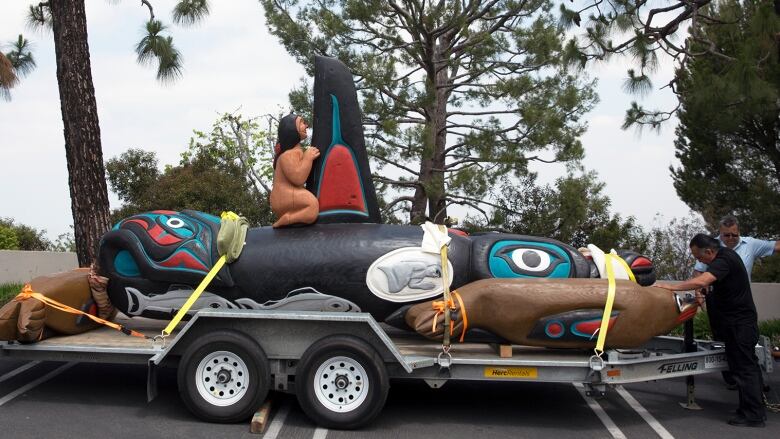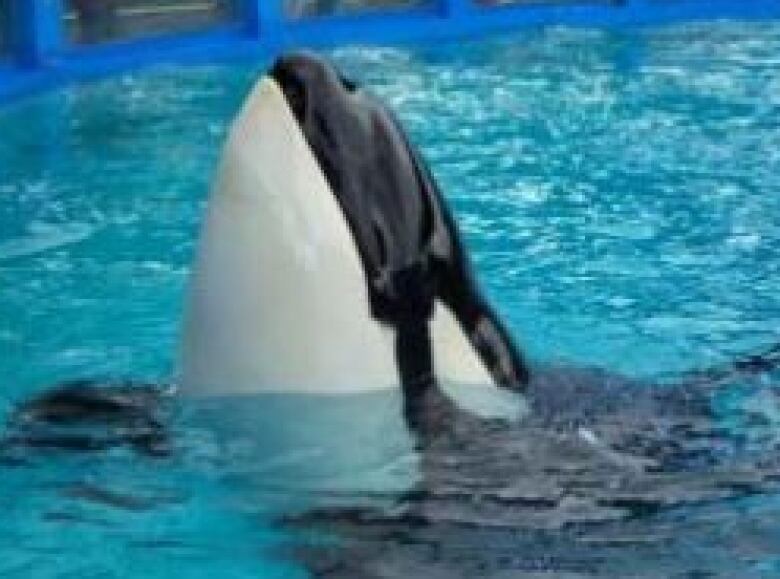Indigenous delegates travel across U.S. to demand orca's release from aquarium
Nation calls whale 'ambassador of the Salish Sea and [part] of our efforts to revitalize this sacred sea'

Members of a Coast Salish Indigenous nation have travelledacross the United States to demand the release of a captive orca from a Florida aquarium.
The Lummi Nation which is based in Washington state but also traces its roots to southern British Columbia has senta delegation to Seaquarium in Miami to call for the release of the whale,Tokitae, and is taking a five-metre-tall 1,800-kilogram totem pole with them.
"The whole goal is to try and create public awareness ... to create enough publicityto help free this whale," head carver Jewell James told On The Coast host Gloria Macarenko.
"Tokitaecould live another 50 years. but the thing is, because of captivity, the whales have not lived very long. ... Half or less of their life expectancy."

Tokitae was captured from the Salish Sea in the 1970s and is 51 years old, the First Nation says.
In a statement, it says the goal is to have the whale freed so it can be shipped back to the Salish Sea, rehabilitated and reintroduced to the wild as part of an $8.5-million plan.
"Tokitae is an ambassador of the Salish Sea, and [part] of our efforts to revitalize this sacred sea," it said. "Our effort is about more than a single blackfish, more than a single blackfish family. It's about healing in different ways."
'Comprehensive' plan
Lummi Nation says it is working with marine biologists to develop what itcalls a "comprehensive" plan for Tokitae to be returned to the Salish Sea.

The First Nation says it needs to pay for the safe transport of the whale. It is also working on buying land in the San Juan islands for a sea pen, "providing a secure home base from which she can venture if and when she chooses."
James insists the plan is doable.
"Not only will she be reintroduced to her native waters, but her pod swims back and forth in that area. So her relatives or family will be right there," James said.
"We're sure that the experts will able to work with her and rehabilitate her."
Plan could be difficult
Brad Hanson, a wildlife biologist with the National Oceanic and Atmosperic Administration, says reintroducing a whale from captivity back into the wild is no small feat.
He says it has been done before, but as far as he knows, never successfully with a whale that has spent so much time in an aquarium from such a young age.
He also said there are concerns about Tokitaeintroducing diseases from her time in captivity to the wild killer whales. It's also possible she may not be able to adequately hunt for food in the wild.
'Reckless and cruel'
Seaquarium, in a statement, said ithad no plans to give the whale up to the Lummi Nation.
It says their effort is not driven by marine mammal experts and the attemptto release Tokitae called "Lolita" by the aquarium is "misguided."
"It would be reckless and cruel to risk her life by moving her from her home solely to satisfy the desire of those who do not understand or care that such a move would jeopardize her life and the life of the other killer whales in Puget Sound," the statement read.
"Lolita will continue to be an ambassador for her species and educate park guests on the plight of the endangered southern resident killer whales from her home at Miami Seaquarium."
Seaquarium says the Lummi Nation should instead focus attention on what it says are the real threats towhale populations in the Salish Sea:overfishing, declining salmon populations and pollution.
With files from CBC Radio One's On The Coast
Listen to the full story:












_(720p).jpg)


 OFFICIAL HD MUSIC VIDEO.jpg)
.jpg)



























































































